Basic Japanese Phrases You Need To Learn before Traveling to Japan
Japan, the Land of the Rising Sun, is an amazing Country with an exciting culture, delicious cuisine and a blend of Nature and Modernness in their cities. Lately, they have proclaimed a new Emperor and to be in the generation to witness such thing happen is an honor.
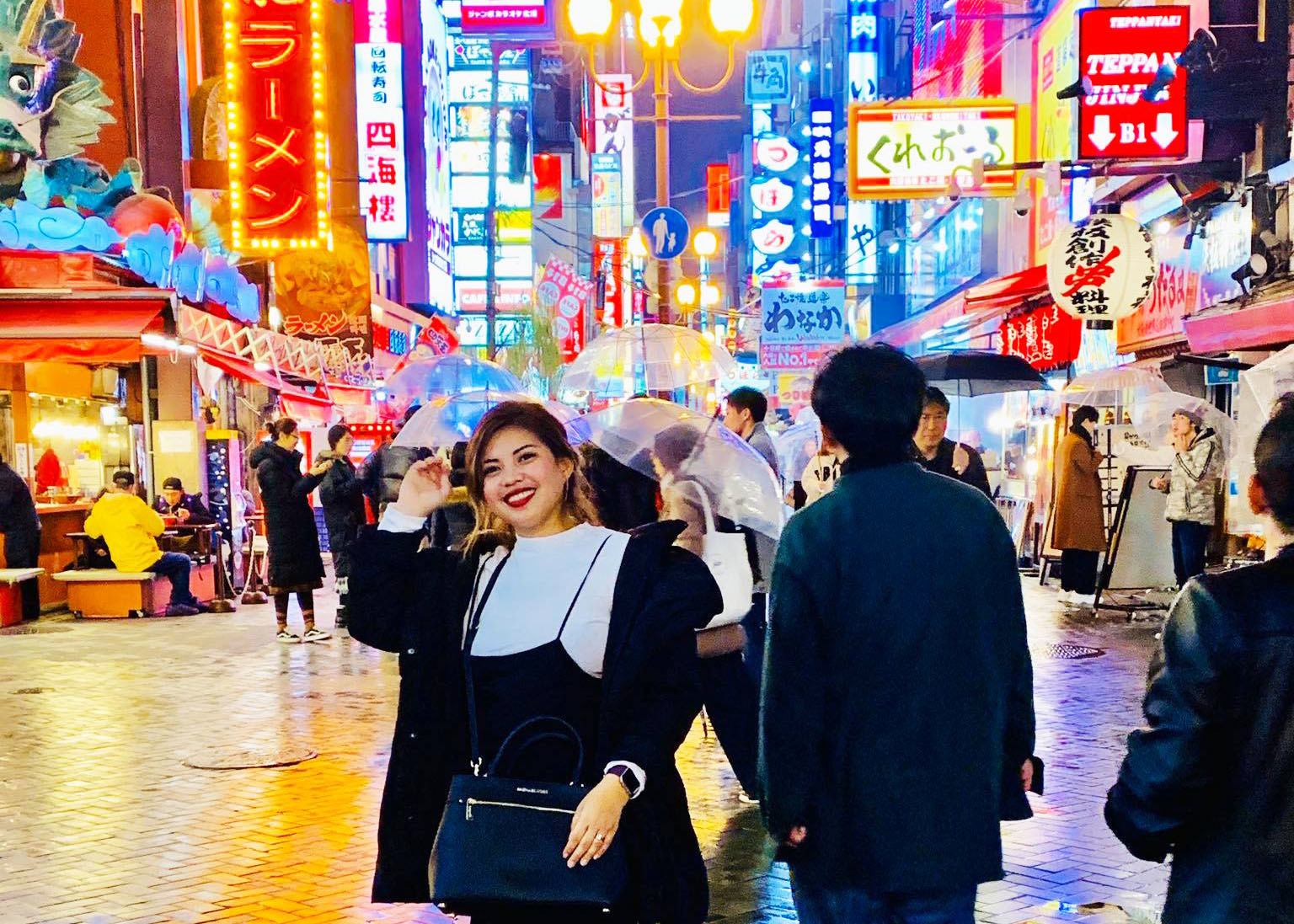
In Japan, besides Japanese, English is being taught to students. However, there are some who are too shy to speak the language. The older generation might not speak or will tell you that they can’t. My friends who went to Japan experience a lot of times when she tends to ask for directions people will say “No English.”
This guide will help you in your travel to Japan as this will list common phrases to be used in Japan. Also, speaking the native language will make locals appreciate you and could get you more help or attention.
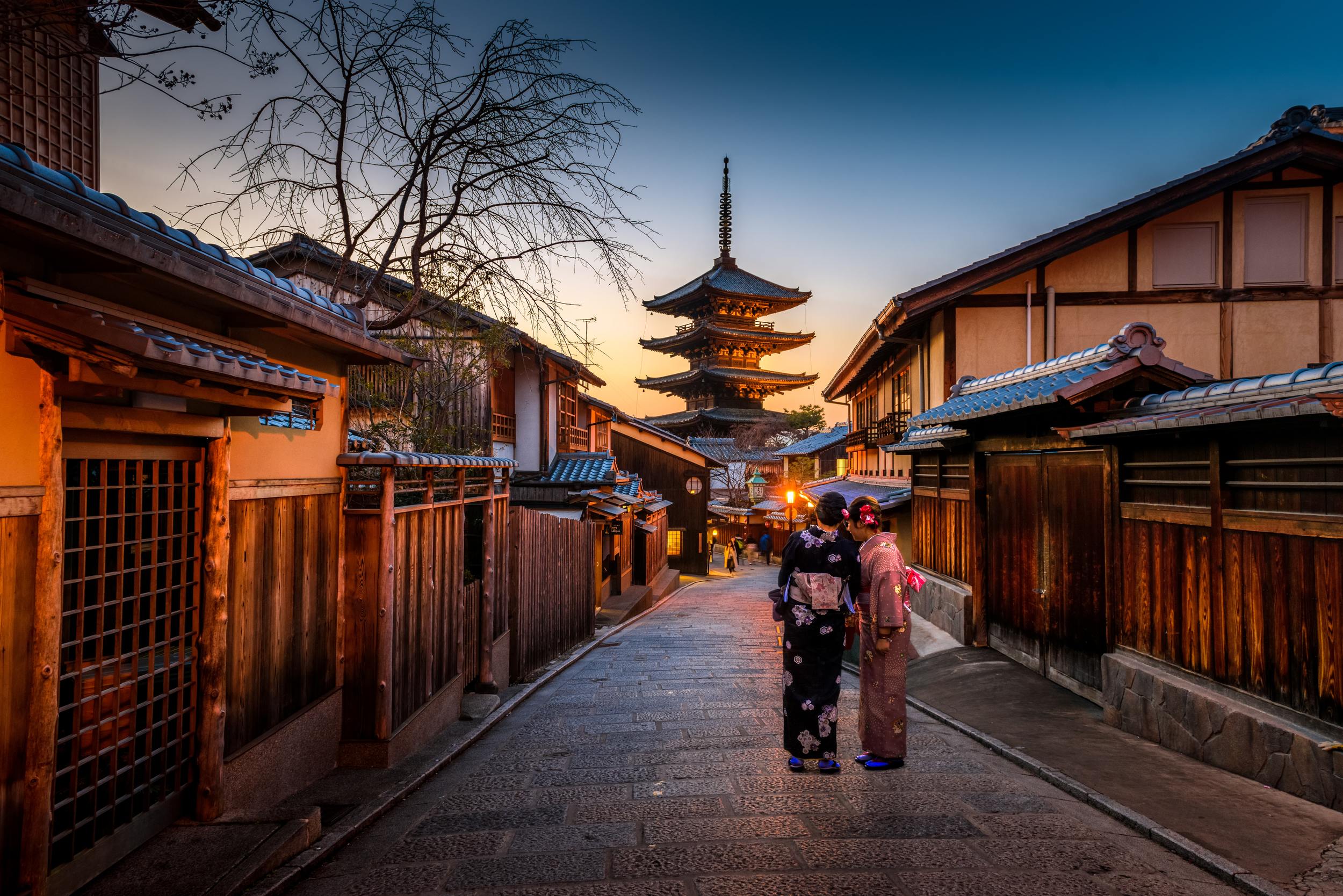
Here are basic Japanese phrases for your Japan Travel including Greetings, Introduction, Basic Responses, Accommodation, Transportation, Food, Emergency and practical terms that will be helpful in your travel in Japan.
Table of Contents
Japan 101
The Japanese language has three components: Hiragana, Katakana, and Kanji. Hiragana is used for Japanese words, Katakana for foreign words, Kanji are Chinese characters. The Japanese are syllables and a pair of consonants and vowels. The lone alphabets are the vowels (A, I, U, E, O) and N. The others are paired (Ka, Ki, Ku, Ke, Ko). Reading is quite easy as you just read it the way it is, except for m, p, t, and those ending with -u as you make it silent.
Hiragana: にほん
Katakana: ニホン
Kanji: 日本
Romaji (Romanized): Nihon
This is Japan in Hiragana, Katakana, and Kanji. All is read as Ni-Hon. For Kanji, this Ni means Sun while Hon means Roots.
There are casual and polite in speaking the Japanese Language; casual is usually good for friends. However, for those tourists, though it is better to use the more polite version, broken Japanese or casual Japanese can be accepted as the polite ones are long and hard to memorize. Let’s say we want to ask where the train is, polite versions is “Eki e doko desu ka?,” you can say “Eki doko?”
Also, the Japanese are very polite; so you need to greet them with a bow and they will bow back. There are different kinds of bow depending on the degrees. A 15-degree bow is okay.
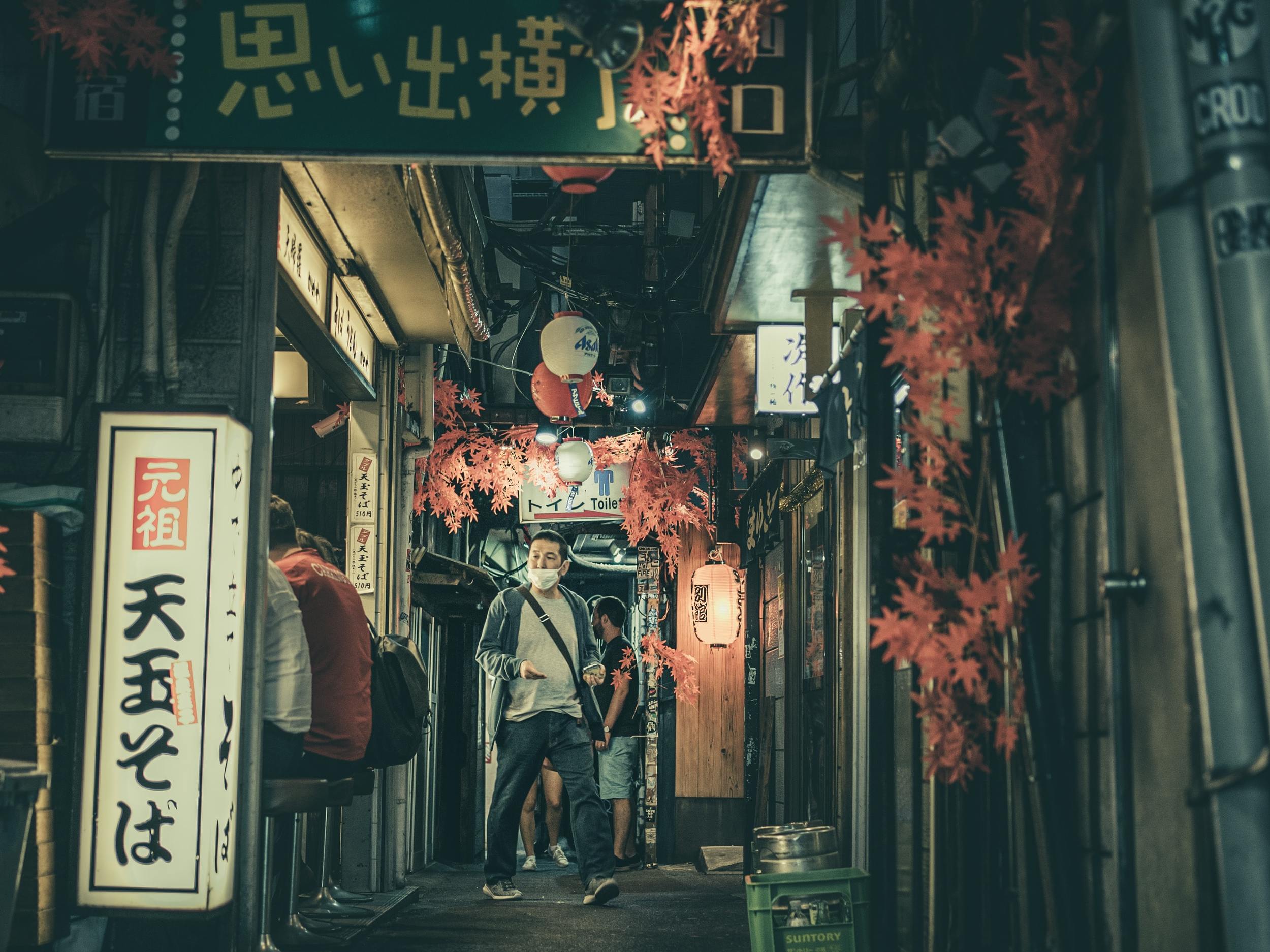
Why is it important for Travelers to know Japanese Phrases?
As I have stated in the introduction, many people are shy in speaking English. When I asked my Japanese Friend why it’s because they are afraid to make mistakes. However, they may understand what you are saying, so you can speak especially the younger generation.
Older generations like those 60 and above might not understand. Also, for outer cities and provinces, English may not be spoken so you will definitely put this in good use.
Greetings
Here are the basic greetings, you can do this with a head bow or a 15-degree bow.
Konnichiwa – Hi. Hello. Good day. Good afternoon.
Ohayou (Gozaimasu) (polite with Gozaimasu, read as Gozaimas) – Good Morning
Konbanwa – Good Evening
Oyasumi(nasai) – Good Night
Sayonara – GoodBye.
Ja or Mata ne (informal) – Good Bye or See You Later
(O)genki desu ka – How are you?
Genki desu – I am fine
Introduction
Sumimasen – Excuse Me.
If asking questions or directions, you may start with this line to locals or strangers.
Please note that when it ends with u like -masu then you say at at -masu.
Watashi wa … desu – I am …
or Onamae wa … desu – My name is …
… kara kimashita – I am from …
… ni sundeimasu – I live in …
Watashi wa (country)-jin desu – I am (nationality).
(Example: Watashi wa Firipin-jin desu – I am Filipino)
Basic Responses
Hai – Yes
Iie – No
Tabun – Maybe
Honto? – Really?
Onegaishimasu (or add kudasai in the sentence) – Please
(Doumo) Arigatou (gozaimasu) (polite) – Thank You
Dou itashimashite (pronounced as do itash-mash-te) – You are Welcome
Speaking
… wo hanashimasu ka (formal) – Do You Speak (language)?
Eigo wo hanashimasu ka – Do You Speak English?
Nihongo – Japanese
Sometimes, you can say “Eigo?” with a questioning tone and they can understand that you are asking if they speak English.
Wakarimasu – I understand
Wakarimasen – I don’t understand
Nihongo wa wakarimasen – I don’t understand Japanese.
Sukoshi Nihongo wo hanashimasu – I speak a little Japanese.
Mou Ichido Onegaishimasu – Again, please (In case someone is speaking to you and you didn’t get some words you can say this)
Yukkuri Onegaishimasu – Slowly, please
Dareka wa Eigo wo hanashimasu ka – Does someone can speak English?
… no Nihongo no iikata – How to say … in Japanese?
Directions and Places
Doko – Where?
… wa doko desu ka (formal) – Where is the …?
Example: Eki wa doko desu ka – Where is the train station?
Eki – Train Station
Hikouko – Airport
Basu – Bus
Hoteru – Hotel
Byouin – Hospital
Konbini – Convenience Store
Depato – Department Store
… ni tsurete itte kudasai – Take me to …, please
… made dore kurai desu ka – How far is it to …
Dono Gurai no … ni tsure te iku no desu ka – How long does it take to …
Dou yatte … ni ikimasu ka – How do I go to ..?
Dochira – Which way?
Dochira e eki desu ka (formal) – Which way is the train station?
Migi – Right
Left – Hidari
Massugu – Straight
… e no chiketto wo 1-mai kudasai – One ticket to …, please
Accommodation
Kushitsu wa arimasu ka – Do you have any rooms available?
1-paku wa ikura desu ka – How much is one night?
Watashi wa … haku shimasu – I will stay for … nights.
Food
…-yo no teburu wo onegaishimasu – A table for … person(s), please.
Menyu o goran kudasai – Can I see the menu, please?
Kono resutoran no senmon wa nan desu ka– What is the specialty of the Restaurant?
Nihon-ryouri wo tabetai – I want to eat Japanese cuisine.
Watashi wa … wo tabemasen – I don’t eat ….
Nomimasu – Drink
Niku (butaniku, toriniku, gyuuniku) – Meat (pork, chicken, beef)
Sakana – Fish
Biru – Beer
Mizu wo itadakemasu ka – May I have water, please.
Kampai! – Cheers!
Ryousho-sho wo onegaishimasu –The bill, please?
Before eating, you may say Itadakimasu – thank you for the meal and Gouchisousama deshita after eating
Shopping
Ikura – How much
Hyaku-en (100-en) – 100 yen
Kore wa ikura desu ka – How much is this?
Kono wa watashi no saizu de motte imasu ka – Do you have that (near you) in my size
Ka-do wo ukeiremasu ka – Do you accept credit card?
Kawase reto wa ikura desu ka – What is the exchange rate?
… ga hitsuyou desu – I need …
kusuri – medicine
tabemono – food
nomimono – drinks
omiyage – souvenirs
Emergency
Tasukete – Help.
Tetsudatte itadakemasen ka – Could you please help me?
Keisatsu wo yobimasu – Call the Police
Mayotte imasu – I’m lost.
Baggu wo nakushita – I lost my bag
Kega o shite imasu – I am injured.
Watashi wa isha o hitsuyou to suru – I need a doctor.
Taishikan ni renraku shitai – I want to contact my Embassy.
Counting
There are different counting terms in Japan, for example for sticks it is i-pon, ni-pon; for hours ichi-jikan, ni-jikan; for months ichi-gatsu, ni-gatsu … But here are the basics on how to count.
Ichi – One
Ni – Two
San – Three
Yon/Shi – Four
Go – Five
Roku – Six
Shichi / Nana – Seven
Hachi – Eight
Kyuu – Nine
Juu – Ten
Juu-ichi – Eleven
Ni-juu-ni – Twenty Two
Hyaku – One Hundred
Sen – One Thousand
man – Ten Thousand
Other terms that Maybe of use
Shashin wo totte kudasai – please take my picture
Shashin wo totte mo ii desu ka – can I take pictures?
Haitte mo ii desu ka – can I enter?
Iriguchi (deguchi) wa doko desu ka – where is the entrance (exit)
Kirei – Beautiful
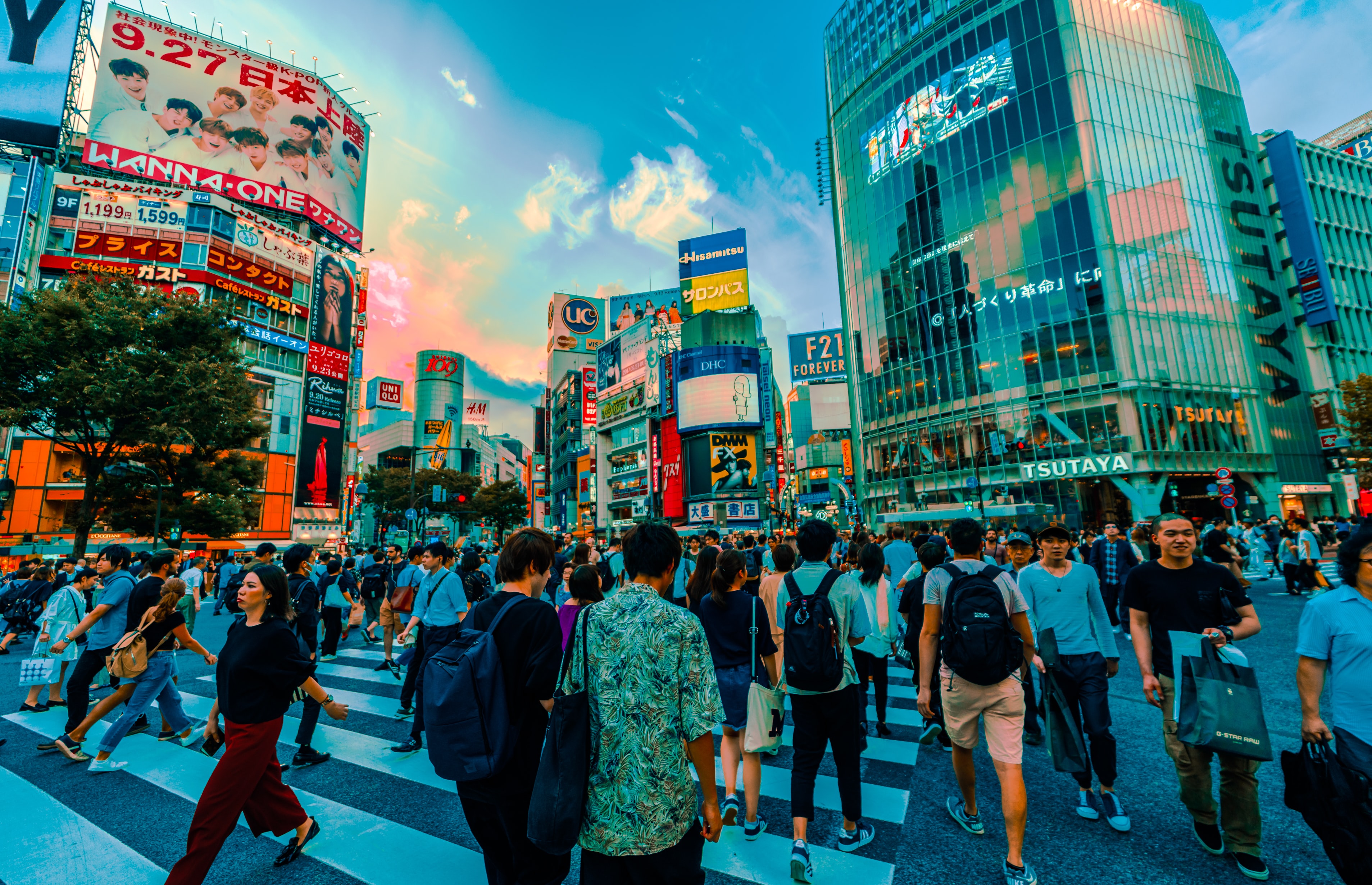
Bookmark this article and use these Basic Japanese Phrases for your travel in Japan. This will really be of help to you and will help you experience talking to Japanese people or make a new friend.

Are you on Pinterest? Pin these!

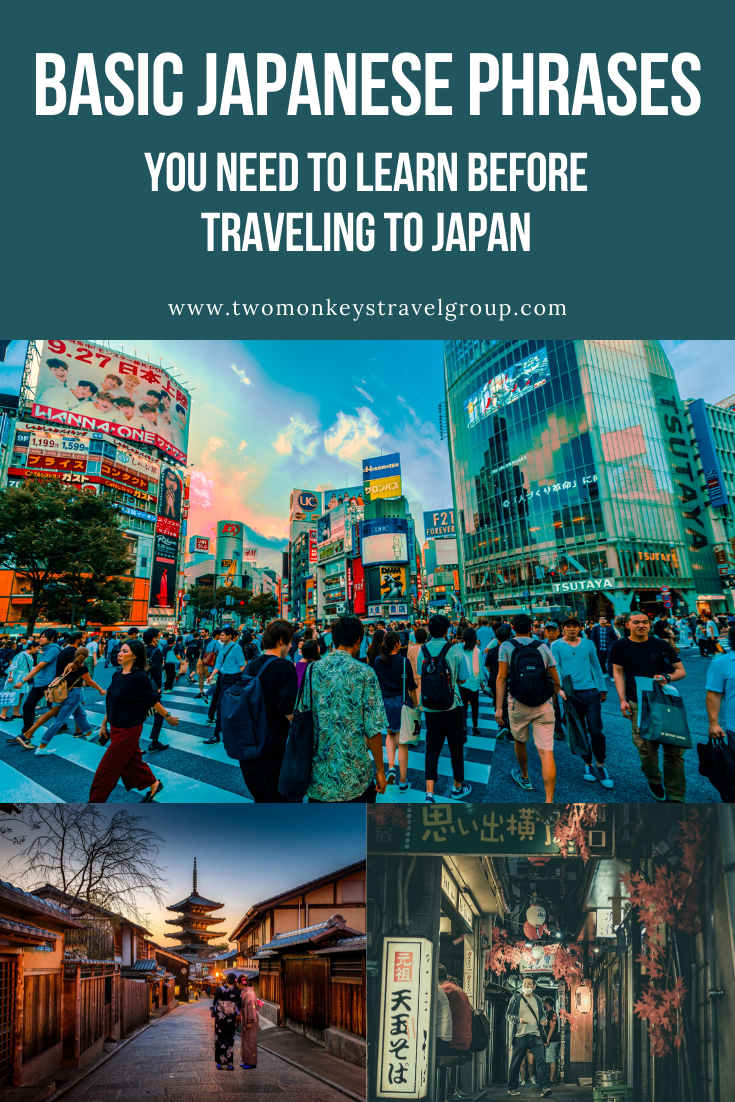
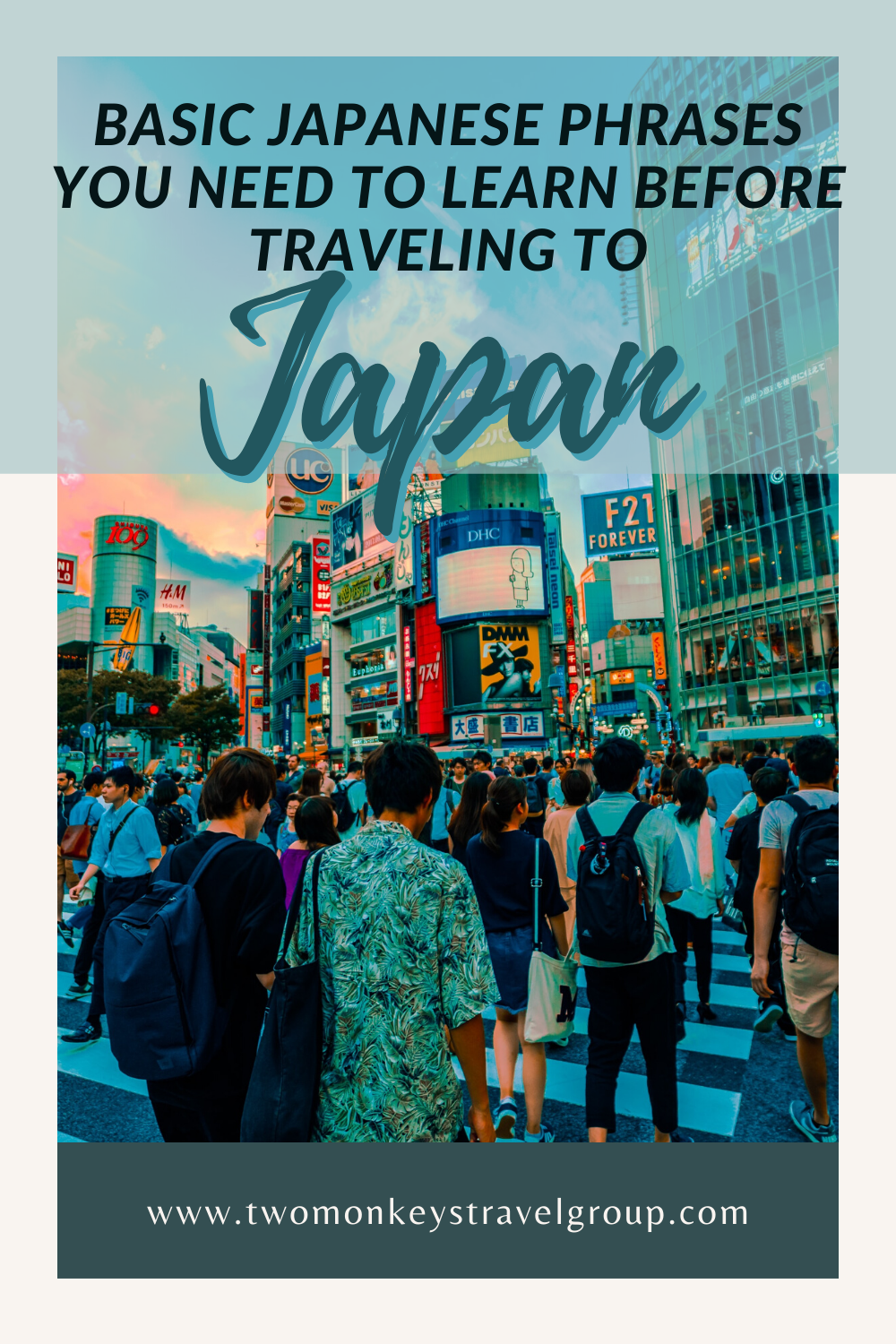
I want to live in Japan forever